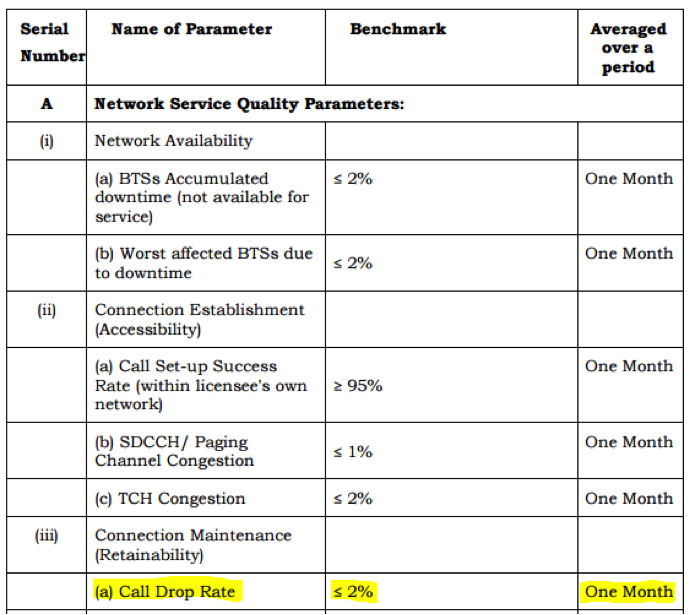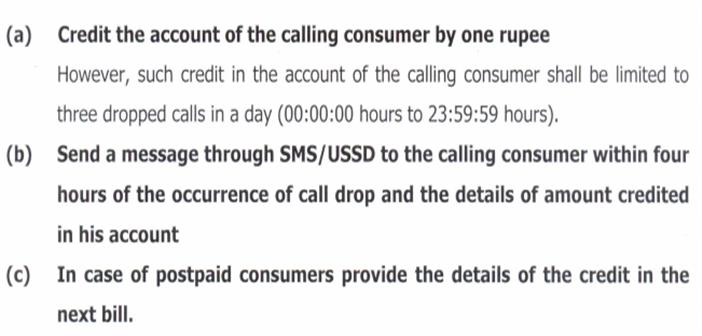[orc]Over time, there is an increase in the number of complaints by consumers about dropped calls resulting in excess charging and a great inconvenience to consumers. TRAI has now directed the Telecom Companies to compensate the consumers for dropped calls. But, will it work?
After an increasing number of complaints about dropped calls, The Telecom Regulatory Authority of India (TRAI) has finally directed the Telecom Companies (Telcos) or Mobile Operators to compensate the consumers in the event of dropped calls. While this might look like a consumer friendly move, the implementation may result in a nightmare.
Quality of Service (QoS) Benchmarks for Mobile Operators
TRAI has laid down Quality of Service (QoS) benchmarks for Mobile telephone services through ‘The Standards of Quality of Service of Basic Telephone Service (Wireline) And Cellular Mobile Telephone Service Regulations’ in 2009. They were subsequently modified in 2012 to include the 3G services. TRAI has also prescribed penalties for failure to meet the QoS benchmarks. Presently, the benchmark for Call Drop (for 2G & 3G) is <=2% over an average period of one month.
Apart from the call drop rate, there are a host of other parameters under the QoS benchmarks that the Telcos have to adhere. These QoS benchmarks can be broadly classified as
- Network Service Quality Parameters
- Consumer Service Quality Parameters
- Service Coverage
- Consumer Perception of Service
- Mobile Data Services
TRAI has amended the above said regulations recently to increase the amount of financial disincentive. According to the latest amendment, for the first contravention reported by the service provider in its quarterly performance report, the financial disincentive would be an amount not exceeding one lakh rupees per parameter. If the service provider fails to meet the benchmark for the same parameter in two or more subsequent quarters, he will be liable to pay an amount not exceeding 1.5 lakh rupees for the second consecutive contravention and not exceeding 2 lakh rupees for each consecutive contravention after that.
The issue of Dropped Calls
According to TRAI, most service providers in the country have reported that they are meeting the benchmark on call drop (<=2%). However, in the last one year, consumers have raised the issue of call drops, with an increasing number complaining that their experience of making voice calls has deteriorated. Against this background, TRAI has issued a Consultation Paper on ‘Compensation to the Consumers in the Event of Dropped Calls’ in September, 2015. In response, TRAI has received written comments from four industry associations, 11 service providers, two consumer advocacy groups, two organizations and 518 individual consumers. An open house was held with the stakeholders on October 1st, 2015 in New Delhi.
During the consultation process, stakeholders raised multiple issues related to dropped calls. A large number of consumers complained of dropped calls in cases where the pulse rate was per minute. Consumers also complained that the phenomenon of dropped calls was not observed when they were making high revenue calls such as roaming, international calls etc. In the event of dropped calls, TRAI aimed at devising measures to provide relief to the consumers in the following areas
- Excess Charging: The consumers may have to pay in excess of what they consume in the event of dropped calls.
- Inconvenience: The consumers may face inconvenience when their conversations are interrupted due to call drops. They may require making several attempts to complete a conversation.
The Telcos on their part raised the following three issues as the main reasons for the problem of dropped calls.
- Instances of sealing/closing down of existing sites for towers by municipal authorities
- Problems in acquiring new sites for towers owing to consumer concerns related to adverse effects of electro-magnetic radiations
- Spectrum related issues
They further argued that compensation for dropped calls in neither justifiable nor practicable.
Compensation for Dropped Calls
After hearing all the sides, TRAI has decided to put in place a mechanism to provide relief to the consumer in the event of dropped calls. According to the new directions of TRAI to be applicable from 1st January, 2016, every originating service provider is mandated to do the following for each dropped call within their network,
- Credit the account of the calling consumer by one rupee: Such credit in the account of the calling consumer will be limited to three dropped calls in a day (00:00:00 hours to 23:59:59 hours)
- Send a message through SMS/USSD message to the calling consumer within four hours of the occurrence of call drop, the details of amount credited in his account
- In case of post-paid consumers, provide the details of the credit in the next bill.
But, will it work?
While this might look like a consumer friendly move by TRAI, the implementation may result in a nightmare for the following reasons. In the latest regulations, TRAI has defined call drop as, a voice call which, after being successfully established, is interrupted prior to its normal completion; the cause of early termination is within the network of the service provider.
Most times, this would result in a difference of opinion between the consumer and the service provider about the dropped call. The consumer will always say that the call dropped because of a problem in the service provider’s network while the service provider will say otherwise. This will only lead to increased litigation and arguments with the customer care. In case of a conflict, the consumer will have to go through the long and painful process of complaint redressal since no specific process has been mentioned in the TRAI regulations.
The Industry associations have already termed this move by TRAI as unjust. While it remains to be seen, if TRAI gives more clarity around these regulations or drop them completely, consumers will now have to watch out for dropped calls with greater care than before.






1 Comment
Doesn’t TRAI consult the public or is it not possible to let TRAI know of the hole in the policy, that there is no clear way for TRAI or anyone to ensure whether the call was dropped after connecting or before, also how to make the claim?